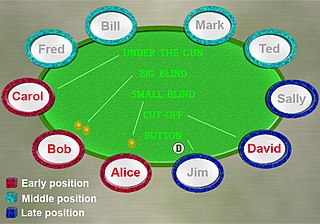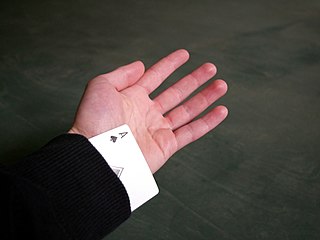This article needs additional citations for verification .(July 2011) (Learn how and when to remove this template message) |
In poker, an isolation play is usually a raise designed to encourage one or more players to fold, specifically for the purpose of making the hand a one-on-one contest with a specific opponent. For example, if an opponent raises and a player suspects he is holding a weak, but playable hand, they may reraise to pressure other opponents to fold, with the aim of getting heads up with the opening raiser.

Poker is a family of card games that combines gambling, strategy, and skill. All poker variants involve betting as an intrinsic part of play, and determine the winner of each hand according to the combinations of players' cards, at least some of which remain hidden until the end of the hand. Poker games vary in the number of cards dealt, the number of shared or "community" cards, the number of cards that remain hidden, and the betting procedures.
Isolation plays are most common against overly-aggressive players ("maniacs") who frequently play inferior hands, or with players who may have a drawing hand. Isolation plays are also common in tournaments to isolate a player who is "short stacked", that is, one who is in imminent danger of elimination, and so is likely to be playing aggressively out of desperation. However, when a player is extremely short stacked compared to the rest of the field in a tournament, making him bust will sometimes be more profitable than winning his chips, so inducing overcalls from other players trumps isolation play. [1]
In the game of poker, opens and raises are considered aggressive plays, while calls and checks are considered passive. It is said that "aggression has its own value", meaning that often aggressive plays can make money with weak hands because of bluff value. In general, opponents must respond to aggressive play by playing more loosely, which offers more opportunities to make mistakes.
A poker player is drawing if they have a hand that is incomplete and needs further cards to become valuable. The hand itself is called a draw or drawing hand. For example, in seven-card stud, if four of a player's first five cards are all spades, but the hand is otherwise weak, they are drawing to a flush. In contrast, a made hand already has value and does not necessarily need to draw to win. A made starting hand with no help can lose to an inferior starting hand with a favorable draw. If an opponent has a made hand that will beat the player's draw, then the player is drawing dead; even if they make their desired hand, they will lose. Not only draws benefit from additional cards; many made hands can be improved by catching an out — and may have to in order to win.

A poker tournament is a tournament where players compete by playing poker. It can feature as few as two players playing on a single table, and as many as tens of thousands of players playing on thousands of tables. The winner of the tournament is usually the person who wins every poker chip in the game and the others are awarded places based on the time of their elimination. To facilitate this, in most tournaments, blinds rise over the duration of the tournament. Unlike in a ring game, a player's chips in a tournament cannot be cashed out for money and serve only to determine the player's placing.
Isolating is encouraged when holding a hand that fares better heads up than in a multi-way pot. For instance, when a player has a small pocket pair he may raise a large amount simply to knock out other players because typically a small pocket pair is about 50–60% likely to win an all-in pot in a heads up situation, but less likely when facing multiple opponents.




